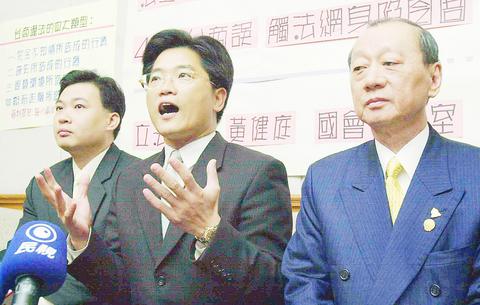In a bid to safeguard the rights of China-based businesspeople from Taiwan, KMT Legislator Huang Chien-ting (
Since Taiwan began allowing businesspeople to operate businesses in China, more than 400 in the Zhujiang area of Guangdong Province have stood trial or been indicted for allegedly violating Chinese regulations, Huang said.
"This statistic shows only those who operate businesses in the area. The actual number of cases elsewhere in China is far larger," Huang said.

PHOTO: CHIANG YING-YING, TAIPEI TIMES
Huang obtained the number from the Chinese Commercial and Industrial Coordination Society, a group that deals with cross-strait trade.
"In severe cases, there are those who get prison sentences," he said.
According to Huang, Taiwanese businesspeople usually find themselves in trouble for four reasons.
"Ignorance, negligence, a constrained business environment and risk-taking are the four reasons that China-based businesspeople find themselves engaging in illegal conduct," Huang said.
Illegal practices such as selling bonded products the Chinese market, making false import/export reports, purchasing invoices from third parties to evade taxes and dishonest management of accounting reports are among the practices that Taiwanese businesspeople engage in before finding themselves in trouble with the legal system in China, Huang said.
Huang said that because there is no official channel set up by the government to give Taiwanese businesspeople a helping hand with legal matters, they have nowhere to turn for advice when they encounter legal problems and thus, in many cases, end up being taken advantage of by Chinese officials.
According to information from the Mainland Affairs Council, as of last December, there were 27,276 registered Taiwanese corporations operating in China. It is widely believed that Taiwanese operations in China far exceed the number accounted for by the government.
Calling on the government to pay attention to the issue, Huang said the government should take proactive measures such as offering legal counsel to China-based businesspeople in order to help them gain a better understanding of the legal system in China.
"Other than providing legal counseling to help Taiwanese businessmen who operate legally in China, the government should also work to provide legal assistance to those who are facing trial in China," he said.

EUROPEAN TARGETS: The planned Munich center would support TSMC’s European customers to design high-performance, energy-efficient chips, an executive said Taiwan Semiconductor Manufacturing Co (TSMC, 台積電), the world’s largest contract chipmaker, yesterday said that it plans to launch a new research-and-development (R&D) center in Munich, Germany, next quarter to assist customers with chip design. TSMC Europe president Paul de Bot made the announcement during a technology symposium in Amsterdam on Tuesday, the chipmaker said. The new Munich center would be the firm’s first chip designing center in Europe, it said. The chipmaker has set up a major R&D center at its base of operations in Hsinchu and plans to create a new one in the US to provide services for major US customers,

BEIJING’S ‘PAWN’: ‘We, as Chinese, should never forget our roots, history, culture,’ Want Want Holdings general manager Tsai Wang-ting said at a summit in China The Mainland Affairs Council (MAC) yesterday condemned Want Want China Times Media Group (旺旺中時媒體集團) for making comments at the Cross-Strait Chinese Culture Summit that it said have damaged Taiwan’s sovereignty, adding that it would investigate if the group had colluded with China in the matter and contravened cross-strait regulations. The council issued a statement after Want Want Holdings (旺旺集團有限公司) general manager Tsai Wang-ting (蔡旺庭), the third son of the group’s founder, Tsai Eng-meng (蔡衍明), said at the summit last week that the group originated in “Chinese Taiwan,” and has developed and prospered in “the motherland.” “We, as Chinese, should never

‘A SURVIVAL QUESTION’: US officials have been urging the opposition KMT and TPP not to block defense spending, especially the special defense budget, an official said The US plans to ramp up weapons sales to Taiwan to a level exceeding US President Donald Trump’s first term as part of an effort to deter China as it intensifies military pressure on the nation, two US officials said on condition of anonymity. If US arms sales do accelerate, it could ease worries about the extent of Trump’s commitment to Taiwan. It would also add new friction to the tense US-China relationship. The officials said they expect US approvals for weapons sales to Taiwan over the next four years to surpass those in Trump’s first term, with one of them saying

‘ABUSE OF POWER’: Lee Chun-yi allegedly used a Control Yuan vehicle to transport his dog to a pet grooming salon and take his wife to restaurants, media reports said Control Yuan Secretary-General Lee Chun-yi (李俊俋) resigned on Sunday night, admitting that he had misused a government vehicle, as reported by the media. Control Yuan Vice President Lee Hung-chun (李鴻鈞) yesterday apologized to the public over the issue. The watchdog body would follow up on similar accusations made by the Chinese Nationalist Party (KMT) and would investigate the alleged misuse of government vehicles by three other Control Yuan members: Su Li-chiung (蘇麗瓊), Lin Yu-jung (林郁容) and Wang Jung-chang (王榮璋), Lee Hung-chun said. Lee Chun-yi in a statement apologized for using a Control Yuan vehicle to transport his dog to a